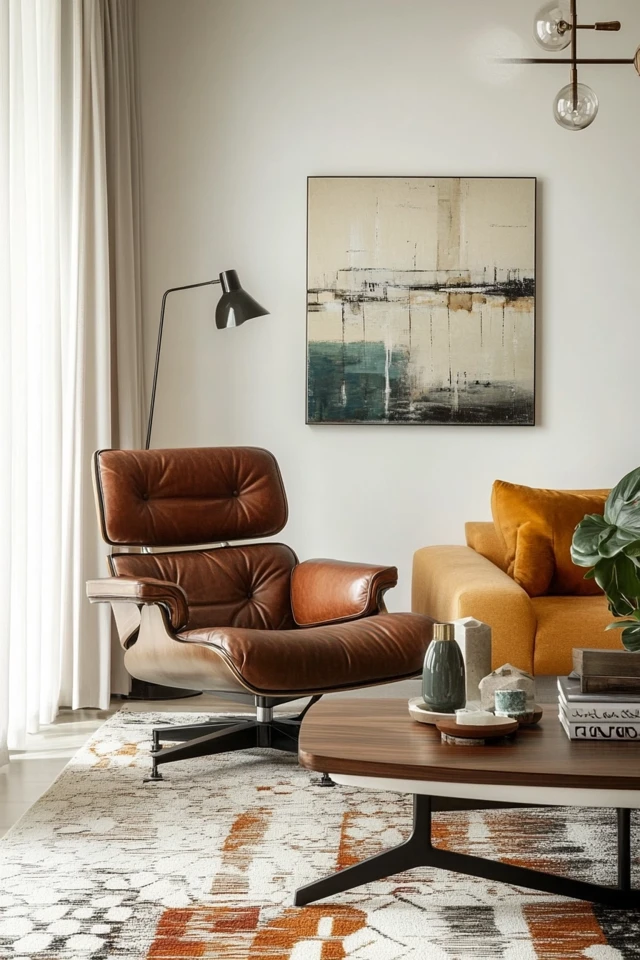Mid-century modern (MCM) design has stood the test of time for good reason—it’s functional, stylish, and effortlessly cool. With its clean lines, bold shapes, and warm wood tones, the retro aesthetic can make your home feel fresh and inviting. However, the key to mastering this style is subtlety. Too many retro elements can make a space feel like a time capsule, while the right balance of mid-century charm and modern touches creates a timeless, livable home.
I’ll never forget when I decorated my first mid-century inspired space. I went all-in with a walnut sideboard, an Eames-style lounge chair, and a starburst clock. It was gorgeous, but something felt off—it was too retro, like I had stepped into a 1960s showroom. After scaling back and mixing in modern accessories, the space felt more balanced and personalized.
In this guide, I’ll share practical tips to help you achieve a retro mid-century modern look without overdoing it.
Why Balance Is Important
While mid-century modern design celebrates bold statements, too much of it can feel overwhelming. A well-balanced approach:
- Keeps the space timeless rather than dated.
- Allows you to blend personal touches with retro-inspired pieces.
- Makes the design feel fresh and functional for today’s lifestyles.
1. Start With a Neutral Palette
Why It Works:
A neutral base provides the perfect canvas for mid-century modern accents without feeling overpowering.
How to Incorporate It:
- Stick to soft whites, grays, or warm beiges for walls and larger furniture.
- Use wood tones (like walnut or teak) to add warmth and texture.
- Limit bold colors to accent pieces like pillows, rugs, or artwork.
Pro Tip: If you want more color, opt for muted retro hues like mustard yellow, olive green, or burnt orange.
2. Choose a Few Iconic Mid-Century Pieces
Why It Works:
A single statement piece—like a vintage credenza or an iconic lounge chair—anchors the room and sets the tone.
How to Incorporate It:
- Invest in one or two standout items, such as a Saarinen Tulip table, Eames lounge chair, or a George Nelson bench.
- Pair these with more understated, contemporary furniture to avoid creating a museum-like effect.
Pro Tip: Choose pieces with clean lines and timeless materials like leather, wood, or metal.
3. Mix in Modern Elements
Why It Works:
Modern accessories and decor prevent your space from feeling stuck in the past and add a contemporary twist to your retro look.
How to Incorporate It:
- Use a sleek modern sofa to balance out vintage side tables or chairs.
- Pair a mid-century coffee table with contemporary lighting, such as a simple globe pendant.
- Incorporate current trends like sculptural vases, abstract art, or minimalist decor.
Pro Tip: Look for modern pieces that share similar lines or materials to mid-century designs for a cohesive look.
4. Keep the Lines Clean and Simple
Why It Works:
Mid-century modern is all about simplicity, so avoid overly ornate details or clutter.
How to Incorporate It:
- Stick to furniture and decor with clean, geometric shapes.
- Avoid over-accessorizing—choose a few meaningful pieces rather than filling every surface.
- Use open shelving sparingly, and keep styling minimal and intentional.
Pro Tip: Group decor in odd numbers (e.g., three vases or books) for visual interest.
5. Incorporate Warm Woods and Natural Materials
Why It Works:
Rich wood tones and organic materials create a cozy, grounded feel while staying true to the mid-century aesthetic.
How to Incorporate It:
- Opt for walnut, teak, or rosewood furniture pieces.
- Add natural elements like jute rugs, leather chairs, or woven baskets.
- Pair wood finishes with softer textures like wool throws or linen pillows.
Pro Tip: Don’t mix too many wood tones—stick to two or three for a harmonious look.
6. Embrace Mid-Century Lighting
Why It Works:
Lighting is one of the easiest ways to introduce mid-century flair without going overboard.
How to Incorporate It:
- Choose a Sputnik chandelier, arc floor lamp, or globe pendant as a focal point.
- Add smaller accents like cone-shaped desk lamps or brass sconces.
- Layer different types of lighting (overhead, task, and ambient) for a warm, inviting glow.
Pro Tip: Stick to finishes like brass, black metal, or matte white for an authentic retro vibe.
7. Add Pops of Retro-Inspired Color
Why It Works:
A few bold pops of color can bring energy to a space without overwhelming the design.
How to Incorporate It:
- Use accent pillows, rugs, or artwork in classic mid-century colors like mustard, turquoise, or rust.
- Paint an accent wall in a rich, muted tone to create depth.
- Choose colorful ceramics or glassware to add personality to shelves or tables.
Pro Tip: Limit bold colors to 2–3 accents to maintain balance.
8. Incorporate Textural Layers
Why It Works:
Texture adds warmth and visual interest, keeping a minimalist mid-century space from feeling too stark.
How to Incorporate It:
- Layer rugs, such as a wool area rug with a cowhide or jute mat.
- Add cushions, throws, or curtains in soft fabrics like velvet, linen, or boucle.
- Mix textures like wood, metal, and woven materials for a rich, layered look.
Pro Tip: Stick to neutral or earthy tones for your textures to maintain a cohesive palette.
9. Curate a Few Retro Accessories
Why It Works:
Retro accessories add personality and charm without overwhelming the space.
How to Incorporate It:
- Display a vintage starburst clock, retro barware, or a record player for a nostalgic touch.
- Use geometric or abstract artwork to tie in mid-century shapes.
- Incorporate small planters or vases in classic materials like ceramic or glass.
Pro Tip: Avoid overloading surfaces—space out accessories for a clean, uncluttered look.
10. Bring in Greenery
Why It Works:
Plants soften the clean lines of mid-century modern design and bring life to your space.
How to Incorporate It:
- Add large statement plants like a fiddle-leaf fig, snake plant, or rubber tree.
- Use mid-century planters with wood or metal stands for an elevated look.
- Incorporate smaller plants like succulents or pothos on shelves or side tables.
Pro Tip: Keep plant arrangements simple and stick to neutral or earthy planters.
Picture Gallery
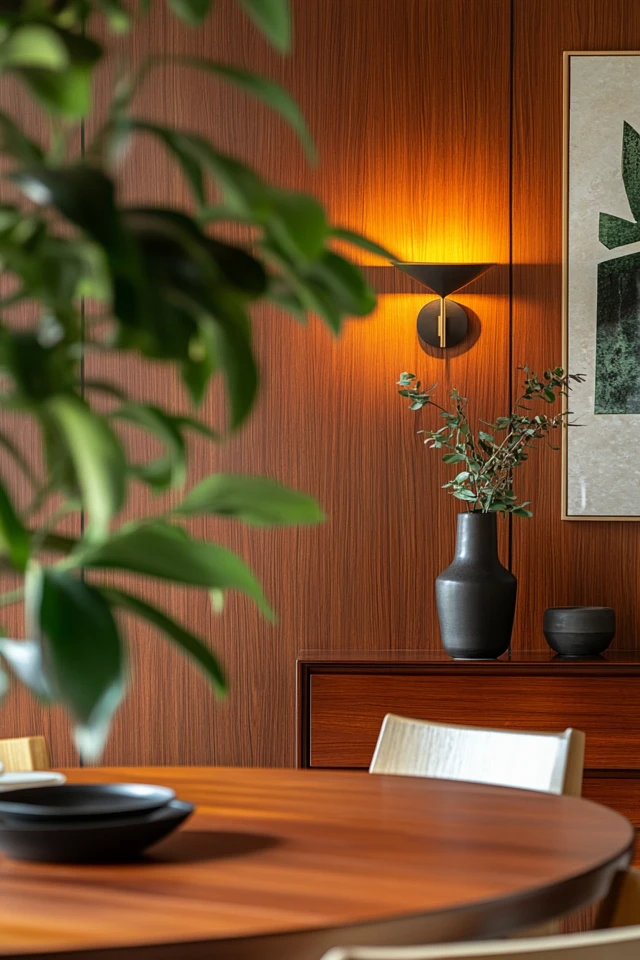
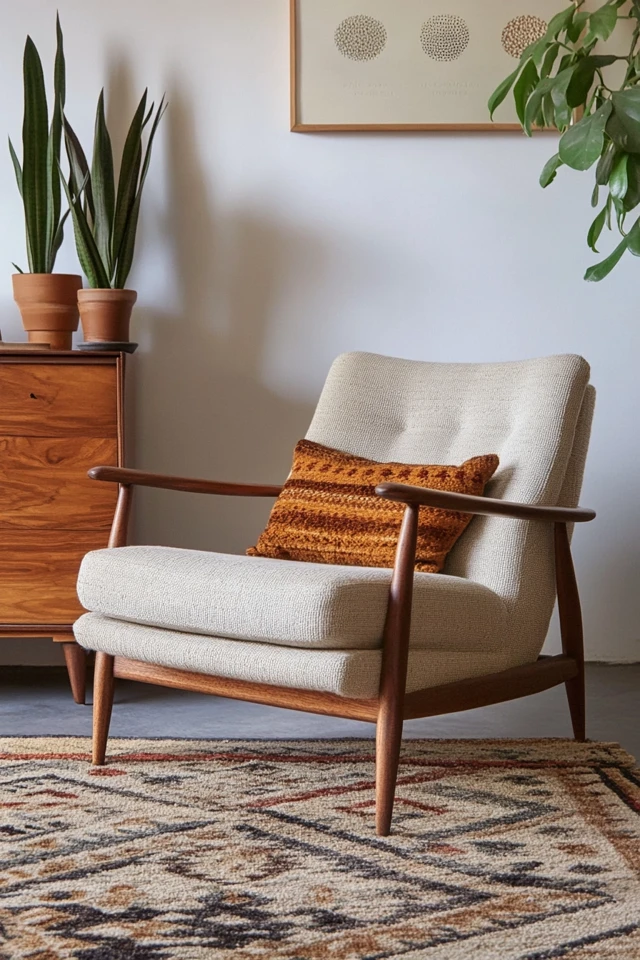
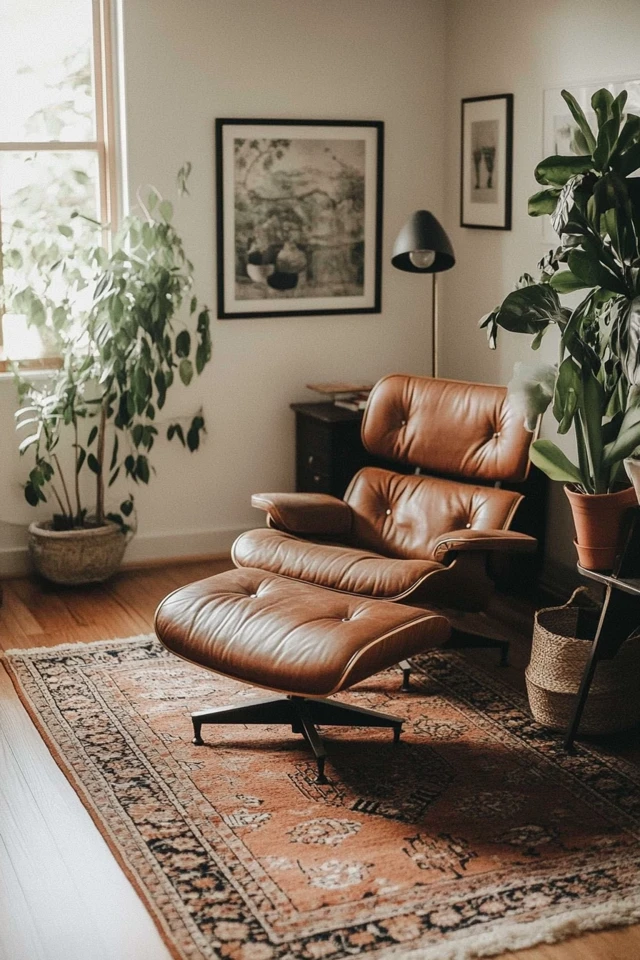
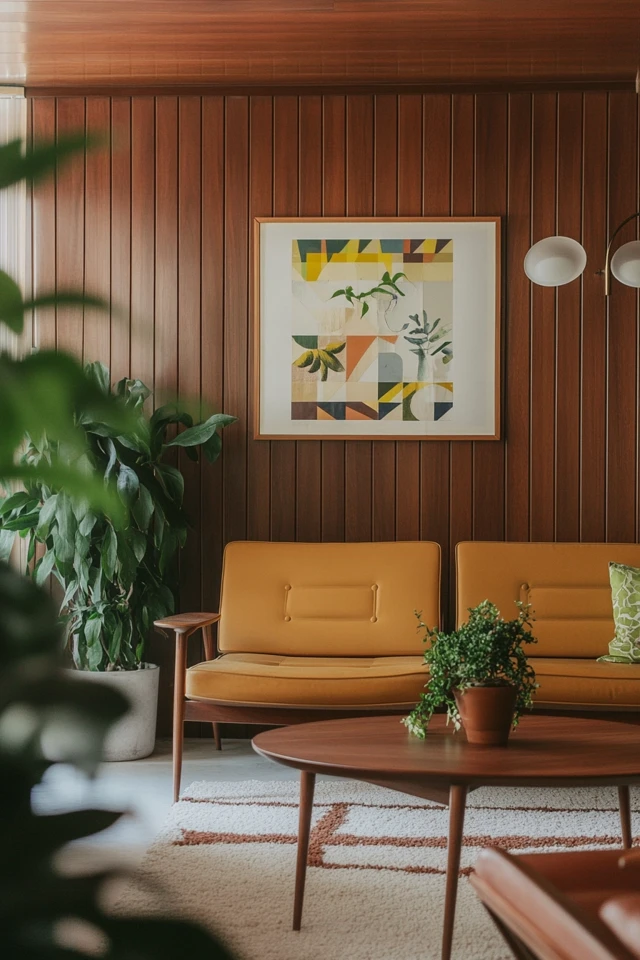
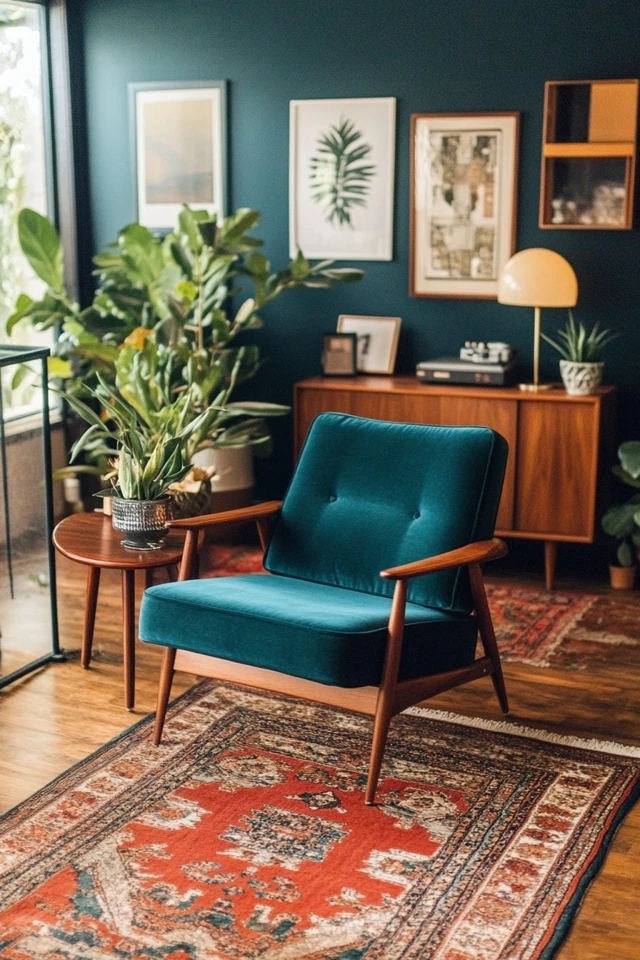
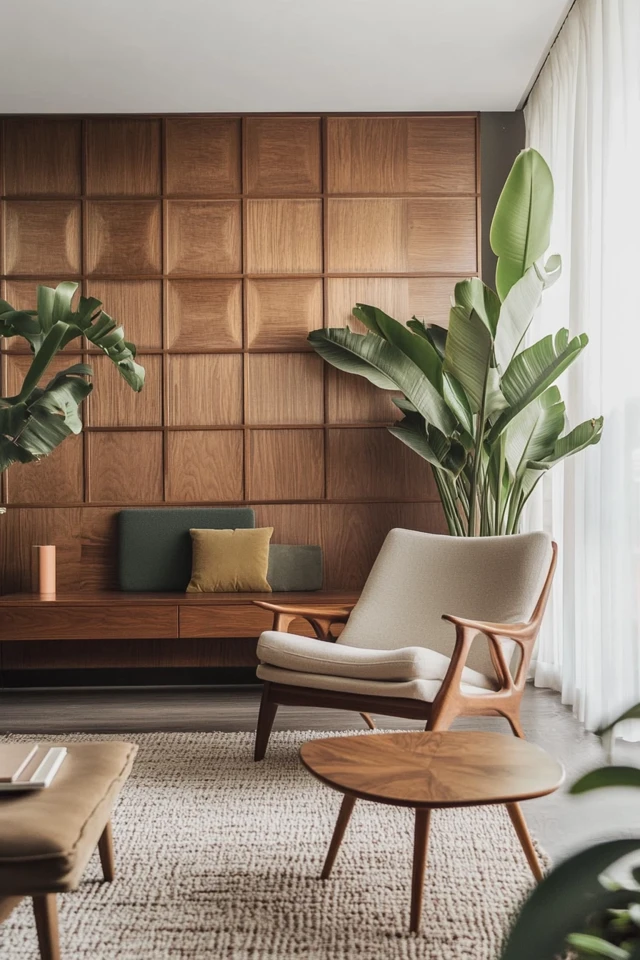
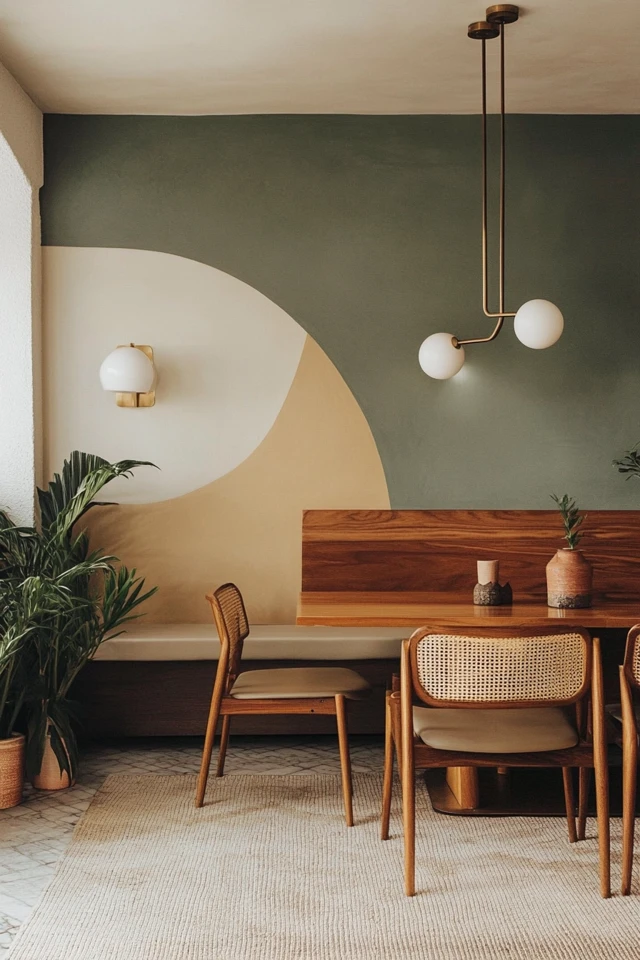
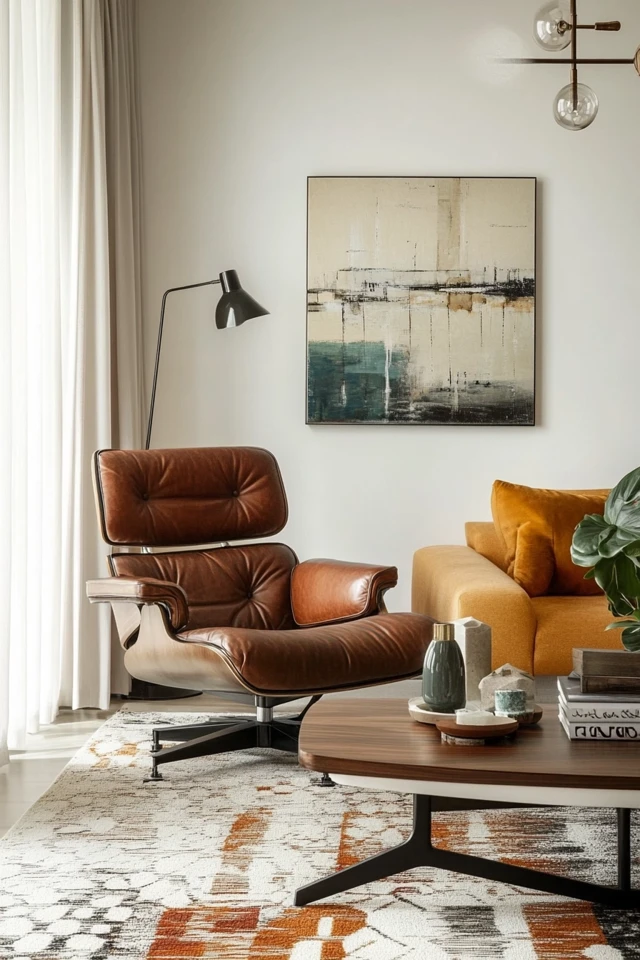
Conclusion
Achieving a retro mid-century modern look doesn’t mean recreating a scene from Mad Men. Instead, it’s about striking the perfect balance between retro charm and modern functionality. By incorporating a few iconic pieces, mixing in contemporary elements, and keeping your design clean and intentional, you can create a space that feels fresh, timeless, and uniquely yours.
So, embrace the warmth of wood, the simplicity of clean lines, and the beauty of retro-inspired accents—and let your mid-century modern home shine.
FAQs
1. How can I avoid overdoing mid-century modern design?
Limit the number of retro pieces and balance them with contemporary furniture or neutral decor.
2. What colors are best for a retro mid-century modern look?
Stick to neutrals like white, gray, and beige as a base, with accents in mustard yellow, teal, olive green, or burnt orange.
3. Can I mix mid-century modern with other styles?
Absolutely! Pair mid-century pieces with bohemian, Scandinavian, or industrial elements for a personalized, eclectic look.
4. How do I make a mid-century modern space feel cozy?
Add textures like wool rugs, velvet pillows, and soft throws. Incorporate warm lighting and greenery for a lived-in feel.
5. Where can I find authentic mid-century modern furniture?
Check out thrift stores, antique shops, or online marketplaces like Chairish or 1stDibs. For affordable replicas, try West Elm, Article, or CB2.

